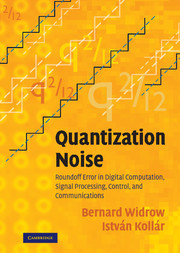 Quantization Noise
Quantization Noise Book contents
- Frontmatter
- Contents
- Preface
- Acknowledgments
- Glossary of Symbols
- Acronyms and Abbreviations
- Part I Background
- 1 Introduction
- 2 Sampling Theory
- 3 Probability Density Functions, Characteristic Functions, and Moments
- Part II Uniform Quantization
- Part III Floating–Point Quantization
- Part IV Quantization in Signal Processing, Feedback Control, and Computations
- Part V Applications of Quantization Noise Theory
- Part VI Quantization of System Parameters
- APPENDICES
- Bibliography
- Index
2 - Sampling Theory
from Part I - Background
Published online by Cambridge University Press: 06 July 2010
- Frontmatter
- Contents
- Preface
- Acknowledgments
- Glossary of Symbols
- Acronyms and Abbreviations
- Part I Background
- 1 Introduction
- 2 Sampling Theory
- 3 Probability Density Functions, Characteristic Functions, and Moments
- Part II Uniform Quantization
- Part III Floating–Point Quantization
- Part IV Quantization in Signal Processing, Feedback Control, and Computations
- Part V Applications of Quantization Noise Theory
- Part VI Quantization of System Parameters
- APPENDICES
- Bibliography
- Index
Summary
Discrete signals are sampled in time and quantized in amplitude. The granularity of such signals, caused by both sampling and quantization, can be analyzed by making use of sampling theory. This chapter reviews sampling theory and develops it in a conventional way for the analysis of sampling in time and for the description of sampled signals. Chapter 3 reviews basic statistical theory related to probability density, characteristic function, and moments. Chapter 4 will show how sampling theory and statistical ideas can be used to analyze quantization.
The origins of sampling theory and interpolation theory go back to the work of Cauchy, Borel, Lagrange, Laplace and Fourier, if not further. We do not have the space here to account for the whole history of sampling, so we will only highlight some major points. For historical details, refer to Higgins (1985), Jerri (1977), Marks (1991).
The sampling theorem, like many other fundamental theorems, was gradually developed by the giants of science, and it is not easy to determine the exact date of its appearance. Shannon (1949) remarks about the imprecise formulation of it that “this is a fact which is common knowledge in the communication art.”
According to Higgins (1985), the first statement that is essentially equivalent to the sampling theorem is due to Borel (1897). The most often cited early paper is however the one of E. T. Whittaker (1915).
Information
- Type
- Chapter
- Information
- Quantization NoiseRoundoff Error in Digital Computation, Signal Processing, Control, and Communications, pp. 13 - 30Publisher: Cambridge University PressPrint publication year: 2008